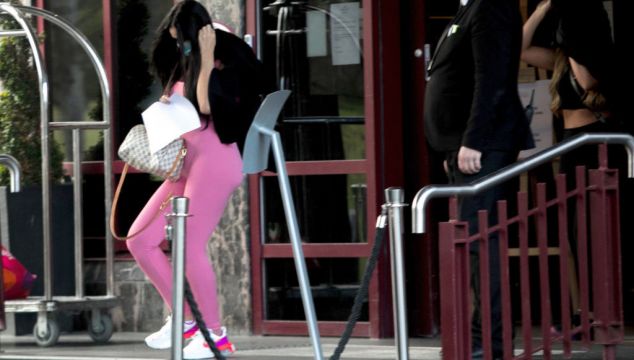Two women looking to halt their prosecution for allegedly refusing to quarantine at a hotel during the Covid-19 pandemic after returning to Ireland from a holiday in Dubai are to bring their case all the way to the Supreme Court.
The Supreme Court has agreed to hear the appeal of the two Dublin women against the High Court's refusal to halt their prosecution.
The Supreme Court held issues of general public importance had been raised in judicial review proceedings brought by Niamh Mulreany (27) and Kirstie McGrath (32) over the delegation of powers to the Minister for Health to require persons coming from certain states to undergo mandatory quarantine on their arrival into this jurisdiction.
Earlier this year, Ms Justice Marguerite Bolger in the High Court dismissed the two women's application for orders preventing their proposed prosecution before the District Court for alleged breaches of measures introduced during the pandemic.
The two women were arrested at Dublin Airport on April 2nd, 2021 on their return from the UAE, where they had intended to but ultimately did not undergo cosmetic surgery.
On their return to Ireland, they and most other passengers travelling from certain designated countries, which at the time included the UAE, were required to undergo mandatory quarantine at a hotel for up to 14 days. The measures were introduced to help prevent the spread of the virus.
Both women allegedly refused to go to the hotel, claiming that they could not afford the cost of the stay, estimated at over €1,800 each, and because they needed to get back to their children.
They claimed they had only had child-minding arrangements in place for the time they were in Dubai.
'Leapfrog' appeal
Arising out of their alleged refusal, both were charged with breaches of the 1947 Health Act, and, if convicted, face fines of up to €2,000 and a period of several months' imprisonment.
They claim the charges against them are unconstitutional.
Their action is against the Director of Public Prosecutions, the Ministers for Foreign Affairs and Health, Ireland and the Attorney General.
Represented by Mark Lynam SC and Keith Spencer Bl, the two sought to have what is known as a "leapfrog" appeal heard directly by the Supreme Court, rather than before the Court of Appeal.
The application was opposed by the respondents, on the grounds that no issues had been raised that required a further appeal.
The Irish Human Rights and Equality Commission is a notice party to the appeal.
In a written determination, a three-judge panel comprised of Mr Justice Peter Charleton, Mr Justice Brian Murray, and Ms Justice Aileen Donnelly agreed that the Supreme Court should determine the appeal.
The court will be asked to determine a number of issues, including if the nature of the emergency then faced by the State justified the measures adopted by the Minister for Health.
The court will also be asked to determine in the appeal if it is permissible under the Constitution for the Oireachtas to delegate certain powers, allowing the Minister for Health to make regulations.
It will be further asked to consider issues regarding the constitutionality of the appeals process contained in the quarantine requirements.
No date has been set for the hearing of the appeal.
In their proceedings, the woman had argued that the Minister for Health's designation of certain states, as places from where persons who travel to Ireland from, had to undergo mandatory periods of quarantine breached the separation of powers, the principle of law and was unconstitutional.
It was claimed that such a measure should have been introduced by way of legislation through a statutory instrument and not by way of a Ministerial order.
The second legal issue concerned an alleged lack of a legally permissible appeals process for those who were undergoing the mandatory quarantine.
In her decision, Ms Justice Bolger in the High Court said the measures clearly provided for the designation of states for mandatory quarantine to be done by way of a decision made by the Minister for Health.
This power was not intended to be done by regulations, the judge added.
The Oireachtas determined that it was in the public interest for the Minister to be able to designate persons coming into the country from a particular state for mandatory hotel quarantine.
Not only did the Oireachtas apply its scrutiny to the power of designation, but it has added an "additional layer of scrutiny" by imposing a sunset clause, the judge added.
This clause meant the entire system of mandatory hotel quarantine had to return before the Oireachtas after a lapse of three months.
The judge also rejected claims that the appeal process was unconstitutional or that Article 37 of the Constitution had been breached.
Birthday celebrations
In March 2021, the two friends travelled to Dubai to celebrate "landmark birthdays" that had been paid for by their relatives and friends.
Initially they had intended to undergo cosmetic surgery procedures in the UAE, but ultimately did not go through with the planned procedures.
Ms McGrath, of St Anthony's Road, Rialto, Dublin 7, and Ms Mulreany, of Scarlett Row, Essex Street West, Dublin 2, claimed
they are lone parents, and their children were being cared for by relatives while they were away.
While abroad, the State introduced quarantine requirements for persons entering the State from countries including the UAE. On their return to Ireland, they allegedly refused to quarantine in a hotel.
They were arrested and charged with breaching Section 38 of the Health (Amendment) Act 2021 due to their refusal to go the designated hotel.
They were granted bail by the District Court the day after their arrest, but were unable to take it up because they could not afford the bond.
They were detained at Mountjoy Women's Prison before being released following a High Court hearing. They were subsequently taken to a hotel where they remained in quarantine for several more days.
At the hotel, they engaged in the State's appeal process. However, their appeals were refused.







